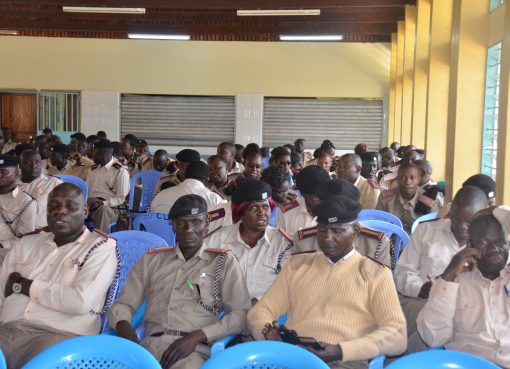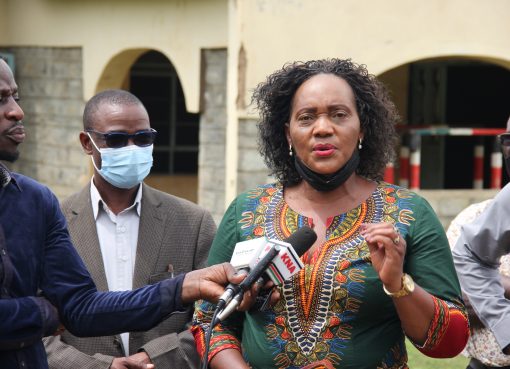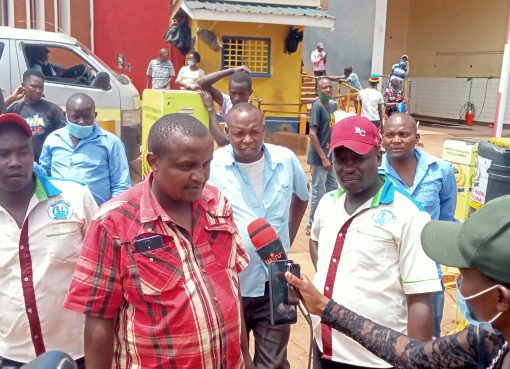Following the worsening drought in the country, the government has stepped up distribution of relief food in various counties as hundreds of households reel under the pangs of hunger.
Through the state department of social protection and special programmes the government has rolled out programmes to mitigate the effects of the prolonged drought that has affected 4.1 million Kenyans up from 3.5 million in March 2022. Another 942,000 children were malnourished across the ASAL areas where Kenyans have lost over 2.5 million livestock.
Tuesday the government distributed relief food to a total of 509,305 affected Machakos residents.
The food which comprises 200,000 Kgs of rice and 80,000 Kgs of beans will be distributed to 142, 630 households in all the county’s nine sub-counties.
Speaking during the flagging off exercise at the Governor’s office, Machakos County Commissioner Rhoda Onyancha said that the national government is working very closely with the county government in order to reach out to the starving residents.
“We have had a county steering group in all the nine sub counties, which extends to each of the 27 wards and every location or the village committees in the county. The village committees will outline which civilians in the villages have been stricken the most so that the relief food benefits them,” said Onyancha.
“We urge all the officers involved, especially the Deputy County Commissioners of every sub-county and their co-chairs, sub-county administrators, to ensure the food is released with transparency and every citizen involved. We encourage the committees to ensure the most affected people benefit,” said Onyancha.
Onyancha said that the relief food is set to benefit around 875 public primary schools which are hunger stricken adding that the county steering group is also dealing with the issue of water scarcity where she noted the efforts of World Vision Group for helping 22 schools overcome water scarcity in Yatta.
Machakos Governor Wavinya Ndeti said that the donations target vulnerable families and school going children and will help address short term hunger issues.
“The foods will help improve student performance and reduce burden occasioned by the high cost of living. No child should skip school due to lack of food. We will give the hunger-stricken people food, but we give priority to children in schools,” said Ndeti.
“I appreciate food donations from Family Bank, Mombasa Cement, SBM Bank, SSD Bank, Balaji County pension Fund and Atta Kenya limited which has donated 9600 Kgs of flour,” added Ndeti.
The county boss added that the county was working hand in hand with the national government to ensure the residents benefit and thanked the county commissioner for making her work easier by ensuring maximum security in the county.
The governor further thanked the National government for reinstating the county into the Arid and Semi-Arid Land (ASAL) adding that the county will build dams and weirs to help curb the water shortage in the region.
She however noted that despite this effort, there are still many households that require food support and requested more donors to continue offering their support.
She further said that the drought situation in the neighboring county of Kajiado has seen a lot of livestock migrating into Machakos in search of pasture, a situation that is likely to trigger conflict.
The drought situation in the county continues to worsen hence the need to urgently initiate response interventions in the short term and long-term continuum.
This situation is dire in 26 out of 40 wards in the county and has affected several sectors including; water, livestock, health, education, agriculture, peace and security sub-sectors hence the need for multi-sectoral approach in addressing the situation.
Livestock have been reported to have died in Athi river sub-county, the dams are drying up and fodder is depleted in most parts of the county with reports of theft of agricultural produce and break-ins in shops owing to food shortages.
Meanwhile three sub counties in Narok County have received the relief food given by the department of Social Protection and Special programmes to mitigate the effects of drought in the county.
The three Trans Mara East, Trans Mara West and Trans Mara South sub counties were each given 400 bags (50 Kilograms) of rice and 150 bags of beans.
Narok County Commissioner Isaac Masinde said about 115,000 families in the county and 130,000 school going children were in dire need of food.
“We have identified areas that are mostly affected by drought. They are parts of Narok South, lower parts of Narok West and Narok East sub counties. We are expecting food for these areas to arrive anytime,” he said.
Masinde asked those who will benefit from the food to use it wisely to feed their families warning them from selling the food as they may continue suffering in hunger.
Elswhere West Pokot County commissioner has said the Relief food donated by government to be distributed to the most vulnerable households.
The government has distributed 1200 bags of rice, 2160 bags of beans and 600 cartons of canned meat to vulnerable households in the affected areas of West Pokot County.
West Pokot sub county Assistant County commissioner (ACC) Ruth Wachera while addressing the press on behalf of the County commissioner, Apollo Okello said those who go hungry due to erratic weathers conditions should benefit most from the relief food donated by government.
Kenya requires sh15 billion to deal with challenges caused by drought in ASAL areas of the country where the amount will go into interventions in food and security, the health and nutrition, agriculture and livestock, water and education.
During a meeting with the government, United States Agency for International Development (USAid) administration Samantha Power said Kenya, Ethiopia and Somalia were hit most by the drought.
Ms. Power said her organization had already provided Sh7.7 billion which was disbursed to over one million people in ASALS where she pledged Sh30 billion in humanitarian and development assistance.
The drought situation is a result of four failed rainy seasons across 23 ASAL counties further escalated by COVID-19 locust invasion aftermath, and the war in Ukraine.
The current drought came against the backdrop of socio-economic stress occasioned by multiple shocks. To mitigate starvation, the government has so far spent Sh12.6 billion through collaborations with development partner’s humanitarian agencies, the private sector and other non-state actors.
The government is also addressing this through provision of more boreholes in ASAL areas, facilitating insurance for farmers and SMEs in case of losses, and mobilizing communities to hard drought-resilient animals as well as grow drought-resistant crops.
The government is also prioritizing school feeding programmes in areas prone to fights over scarce resources to keep children in schools and prevent malnutrition.
By KNA Team




